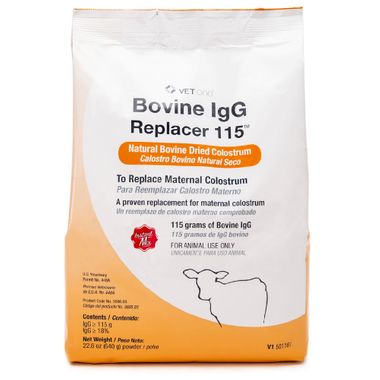SAVE 20% OFF 20% OFF Use Code PREZ20 *

Bovine IgG Replacer 115, Natural Bovine Dried Colostrum (640 gm)
- Notice
- Description
- Ingredients
- Directions
- Reviews
Notices
This is our Rock-Bottom-Price! Sorry, Promotional offers do not apply (See Exclusions.)
Description
Bovine IgG is made from natural bovine colostrum and is used to replace or supplement maternal colostrum as an aid in the treatment of Failure of Passive Transfer (FPT) in newborn calves.
- 15% higher Bovine IgG content than most other leading brands of Supplements & Replacers on the market
- Actual colostrum, no other ingredients added, nothing taken away
- Not a generic
- Easy to use, mixes instantly
- Each bag of Supplement 57.5 provides > 57.5 g of Bovine IgG (> 18% IgG)
- USDA approved and licensed
- Guaranteed for safety, efficacy, purity and potency.
- High energy/brown fat metabolism from colostral fat.
- Made from large pools of colostrum from many different individuals which guarantees product contains a wide variety of antibodies to all agents in the dairy calf environment including protective levels to E. coli
Ingredients
| Typical Analysis (per bag) | |
|---|---|
| Bovine IgG | (57.5g) ≥ 18% |
| Crude Protein | 55% |
| Crude Fat | 16% |
| Reconstituted Volume | 1.9 qt |
INGREDIENTS: Bovine Colostrum
Directions
Indications:
Replacer 115™ is used to replace maternal colostrum as an aid in the treatment of Failure of Passive Transfer (FPT) in newborn calves.
Replacer 115™ is intended for calves needing a balance of both immunity and energy.
Replacer 115™ is a natural bovine colostrum powder that is high in IgG and rich in colostral fat, a critical early source of energy for newborn calves.
Replacer 115™ is an excellent source of IgG (over 85% in the form of IgG1), growth factors, and nutrients needed to improve calf survival, health, growth, and long term performance. It is not a manufactured formula based on blood serum, whey, eggs, vegetable fats or other ingredients not naturally found in colostrum.
Feeding Recommendations
Feed colostrum equaling 10% of body weight [about 4 quarts for most Holstein calves] in the first 2 hours of life with target serum IgG of >10 mg/mL and total protein of >5.2 g/dL.
Calves fed 1 package to completely replace maternal colostrum achieved average serum IgG levels of 14.6 mg / mL and average serum protein levels of 5.0 g / dL. Feeding additional amounts provide health benefits and is recommended when calves have a birth weight > 106.7 lbs or 48.5 kg, are stressed or calfhood disease incidence is high.
| To Replace Maternal Colostrum | |||
|---|---|---|---|
| Number of Packages | Amount IgG fed | Amount Water | Final Volume |
| 1 (640 g) | 115 g | 5 cups | 1.9 quarts |
| 1.5 (960 g) | 172.g | 7.5 cups | 2.8 quarts |
| 2 (1280 g) | 230 g | 10 cups | 3.8 quarts |
Which product is right for me?
VetOne Replacer 115 and Supplement 57.5 can be used to replace or supplement maternal colostrum. Both products contain the same colostrum but deliver different levels of immunity purely based on package size. With both products you can adjust the feeding quantity to offer the required amount of IgG in grams. For instance, Supplement 57.5 can be fed to achieve higher levels of IgG in the calf by simply feeding more bags.
Replacer 115 and Supplement 57.5 are uniquely balanced for both IgG and fat and closely mirror the composition of good quality maternal colostrum. Both IgG and energy in colostrum are critical for the calf’s survival during the first weeks of life.
How much IgG should be fed for a total replacement of maternal colostrum?
Ideally, you should aim for excellent passive transfer levels. The more colostral IgG is offered to the newborn calf, the higher are the IgG serum levels at 24h of age. Several studies have demonstrated the positive relation between the amount of IgG fed to the newborn calf, serum IgG levels at 24h of age and calf performance and health before weaning.
What IgG level should I use for a booster with maternal colostrum?
It is advised to test maternal colostrum with a % brix digital refractometer. When you have poor quality maternal colostrum you can supplement with VetOne colostrum products. The recommended level depends on the % brix estimated amount of IgG present in the maternal colostrum. The table below gives guidance for reaching excellent serum IgG levels.
| Colostrum supplementation of % brix tested maternal colostrum | ||
|---|---|---|
| Maternal colostrum (% brix) | Recommendation | Amount of IgG to add (g) |
| 16 or less | Replace completely | 180 - 200 g IgG (2 bags Replacer 115 or 4 bags Supplement 57.5) |
| 17-22 | Supplement | 60 - 100 g IgG (1 bag Replacer 115 or 2 bags Supplement 57.5) |
| 23 or more | Do not supplement | 0 |
Under which conditions do calves need more IgG’s?
Especially in cases of prolonged dystocia (more than 1 hour to pull the calf). Prolonged dystocias usually result in hypoxia, metabolic acidosis, and decreased perfusion to the intestines and consequently result in a decreased capability of the calf to absorb IgG from colostrum. It is recommend to feed these calves 30-50% more IgG to increase the chances of absorption. Calves should be fed more when calves are stressed, calfhood disease incidence is high, environmental conditions are unfavorable, when the dam exhibits poor mothing instincts or for twin births or IVF calves.


